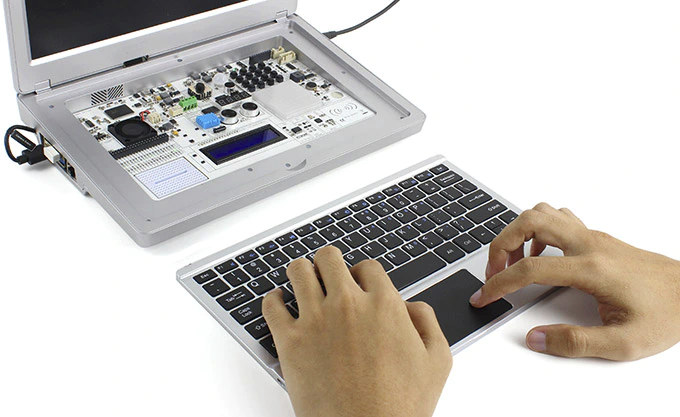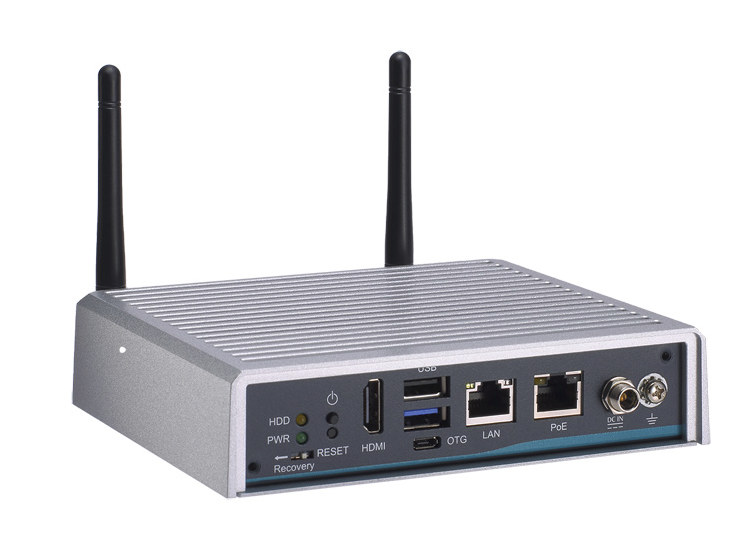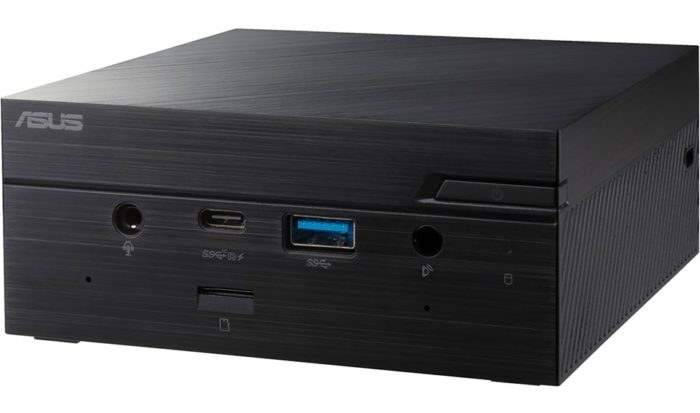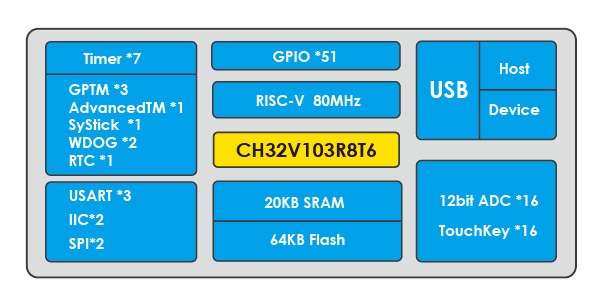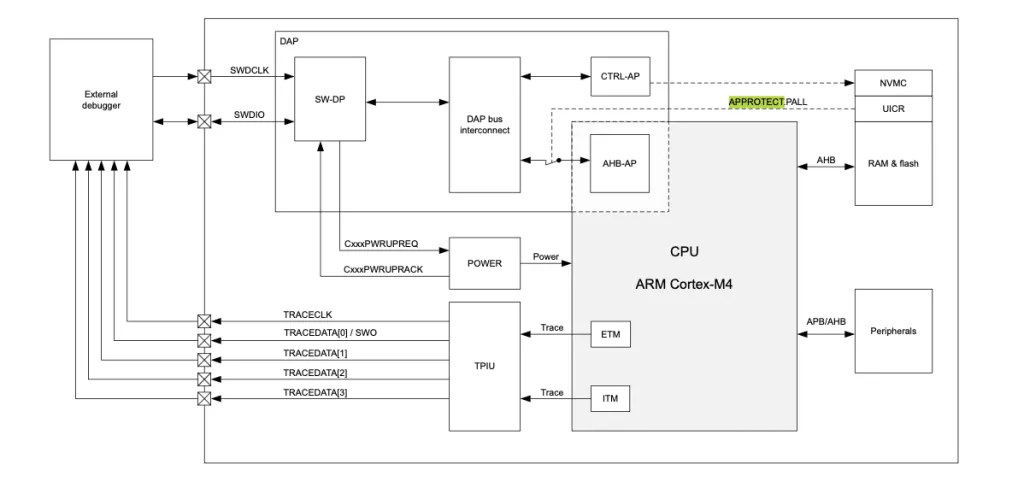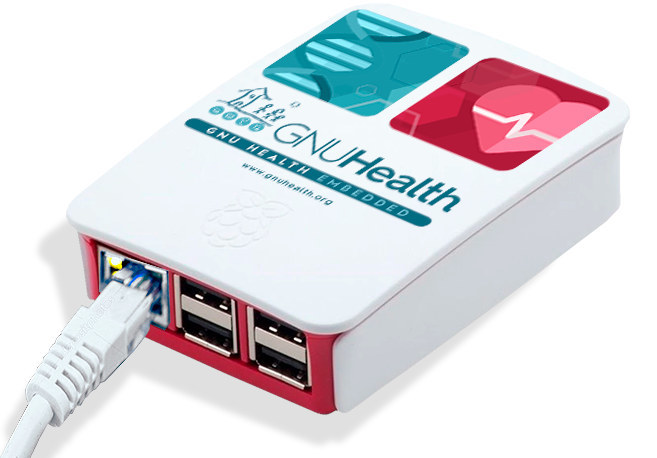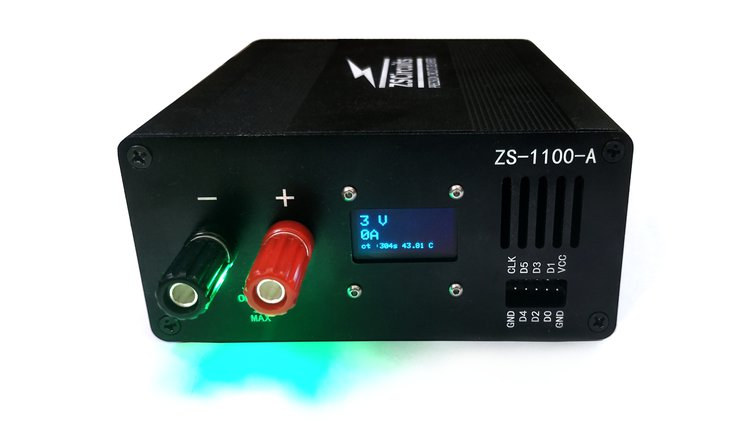When you use a laptop or computer with Windows or Linux, you’re pretty much assured to get regular security updates. That’s partially why I prefer to do things like online banking on my computer rather than a phone, despite banks pushing for mobile apps. Why? Because most mobile phones get limited support. I selected an Android One phone, namely Xiaomi Mi A2, because I would get updates for at least 18 months. When you think about it it’s quite pathetic, but that’s about the best Android has to offer. It’s quite better on Apple side with updates for 4 to 5 years for iPhones, while Google Pixel phones are said to get updates for about 3+ years. How you deliver updates also matter, as I recently heard Samsung users complain about frequent updates, while they had somehow no such complaint about their iPhone. But if you’re not quite ready to […]
CrowPi2 Raspberry Pi 4 Laptop Doubles as Electronics Learning Kit (Crowdfunding)
CrowPi portable learning kit for Raspberry Pi 3 B+ and Pi Zero boards was launched in 2018. It comes with a 7″ display, several sensors, buttons, a breadboard, and more all packed in a small suitcase. Elecrow has now started a new crowdfunding campaign on Kickstarter to fund the second generation portable electronics learning kit: CrowPi2 which looks much more like a laptop than a suitcase found in the first model thanks to a large display, and a detachable keyboard placed on top of the electronic prototyping/learning area. It’s also more powerful thanks to the latest Raspberry Pi 4 SBC. CrowPi2 specifications: Compatible Raspberry Pi boards – Raspberry Pi 3B/B+, Raspberry Pi 4 Display – 11.6-inch 1920×1080 IPS screen Camera – 2MP camera Audio – Built-in microphone and stereo speaker; 3.5mm audio jack Keyboard – 2.4GHz detachable wireless keyboard (QWERTY only) with touchpad Sensors and Modules under the keyboard: Displays […]
NVIDIA Jetson Nano Powered Edge AI System Supports one PoE Camera, Operates in -30 to +60°C Temperature Range
Axiomtek AIE100-903-FL is a fanless edge AI System powered by NVIDIA Jetson Nano system-on-module and designed to connect a single 15W PoE camera for AI computing, edge computing, smart retail, smart city, and more. The solution can operate in a wide range of temperatures from -30°C to +60°C and comes with an optional IP42-rated waterproof cover kit that makes it suitable for use in moist places and “semi-outdoor environments” including freezers and under eaves (edges of the roof which overhang the face of a wall) and other outdoor locations with some protection against rain. Axiomtek AIE100-903-FL specifications: SoM – NVIDIA Jetson Nano with quad-core Arm Cortex-A57 processors, 128 CUDA core NVIDIA Maxwell GPU, 4GB 64-bit LPDDR4 and 16GB eMMC flash Storage – 1x M.2 Key M 2280 with PCIe x4 NVMe SSD slot, 1x Micro SD slot Video Output – 1x HDMI 2.0 up to 4K2K @ 60 Hz Connectivity […]
ASUS PN50 – The World’s First AMD Ryzen 4000U Mini PC
AMD Ryzen 4000-U Series family was announced in January with the 15W processors targetting ultra-thin laptops. It’s already been found in laptops and the first reviews of Acer Swift 3 were positive with the laptop being slim, fast, and offering long battery life. But I had yet to see an AMD Ryzen 4000U mini PC until today, with ASUS PN50 mini PC shipping with a choice of five processors from AMD Ryzen 3 4300U to Ryzen 7 4800U, and a design identical to the company’s PN60 mini PC powered by Intel Kaby Lake Refresh processors. ASUS PN50 specifications: SoC (one or the other) AMD Ryzen 7 4800U 8C/16T processor up to 1.8 / 4.2 GHz with 8-core Radeon Graphics; 12MB L2/L3 cache AMD Ryzen 7 4700U 8C/8T processor up to 2.0 / 4.1 GHz with 7-core Radeon Graphics; 12MB L2/L3 cache AMD Ryzen 5 4600U 6C/12T processor up to 2.1 […]
WCH CH32V103 General-Purpose RISC-V MCU Offers an Alternative to GD32V RISC-V Microcontroller
Last year, WCH introduced their first RISC-V MCU with CH572 Bluetooth LE microcontroller which came with 10KB SRAM and a not so convenient 96KB OTP flash. But I’ve just been informed the company has introduced their first general-purpose RISC-V MCU family with several CH32V103 microcontrollers featuring up to 64KB Flash and 20KB SRAM, and all sort of peripherals you’d expect from a general-purpose MCU. WCH CH32V103 key features and specifications: CPU Core – 32-bit RISC-V (RV32IMAC) core @ up to 72/80 MHz called ” RISC-V3A” Memory – 10KB or 20KB SRAM Storage – 32KB or 64KB flash Peripherals 1x USB 2.0 Full Speed Host/Device Up to 2x SPI (master/slave), up to 2x I2C, up to 3x USART Up to 16x 12-bit ADC/touch key 37x or 51x GPIOs Up to 3x general-purpose timers, 1x advanced timer, 2x watchdog timers, 1x Systick Supply Voltage – 2.7 to 5.5V Package – LQFP48, QFN48 […]
Nordic Semi nRF52 WiSoCs are Susceptible to Debug Resurrection using APProtect Bypass
Nordic Semi nRF52 are popular wireless Cortex-M4 SoCs with Bluetooth 5.0 and 802.15.4 radios. APProtect (Access Port Protection) is a new security feature of nRF52 MCUs designed to enable readback protection and disable the debug interface. This is supposed to prevent an attacker to obtain a copy of the firmware that would allow him/her to start the reverse engineering process or access some sensitive data such as keys and passwords. It’s all good, except “LimitedResults” managed to bypass APProtect and permanently resurrect the debug interface on nRF52840-DK and a Bluetooth mouse. This requires physical access to the hardware and relies on a fault injection technique. The APProtect background and hacking technique are all explained in detail on LimitedResults blog post, but basically he first had to remove some capacitors and use a low-cost homemade voltage glitching system combines with an oscilloscope to try to locate a particular pattern into the […]
GNU Health Embedded Open Source Health Platform Works on Raspberry Pi 3/4, and soon Olimex SBC’s
GNU Health (GH) is a free and open-source Health and Hospital Information System (HIS) that can manage the internal processes of a health institution, such as financial management, electronic medical records (EMR), stock & pharmacies or laboratories (LIMS). It is already used in various hospitals, health centers, and medical research facilities in various countries, most developing countries, across the world. The program would normally be installed on x86 servers running Linux or FreeBSD, but there’s also a version for Raspberry Pi 3 and 4 based on openSUSE called GNU Health Embedded, and work is being done to port the solution to Olimex OlinuXino SBC’s. Contrary to what the photo above implies, GNU Solidario does not sell the hardware pre-loaded with GNU Health Embedded, but you can download it for free from their servers, and if you want to support the project you could always make a donation. As I understand […]
ZS1100A IoT Power Meter Supports Sigrok Open-Source Software (Crowdfunding)
A few months ago, I tested Qoitech Otii Arc power meter & DAQ system designed for developers of IoT devices, and fount out it would be incredibly useful to developers of battery-operated devices since it shows voltage and current graphs synchronized with the serial output making it easy to see where software might be optimized. The system can also capture analog and digital signals from the DUT and emulate batteries with user-defined characteristics. But this weekend, I’ve come across a very similar solution with ZS1100A IoT power meter that also happens to be compatible with Sigrok open-source signal analysis software, and the corresponding Pulseview GUI. ZS1100A IoT power meter specifications: Measurements Output Voltage Range – 0 to 6 V programmable in 10 mV steps with +/- 5mV accuracy, Current Measurement Range – -0.5 A to 1.5 A (linear range) with < 0.1 μA resolution, accuracy of 1% of measured value […]


